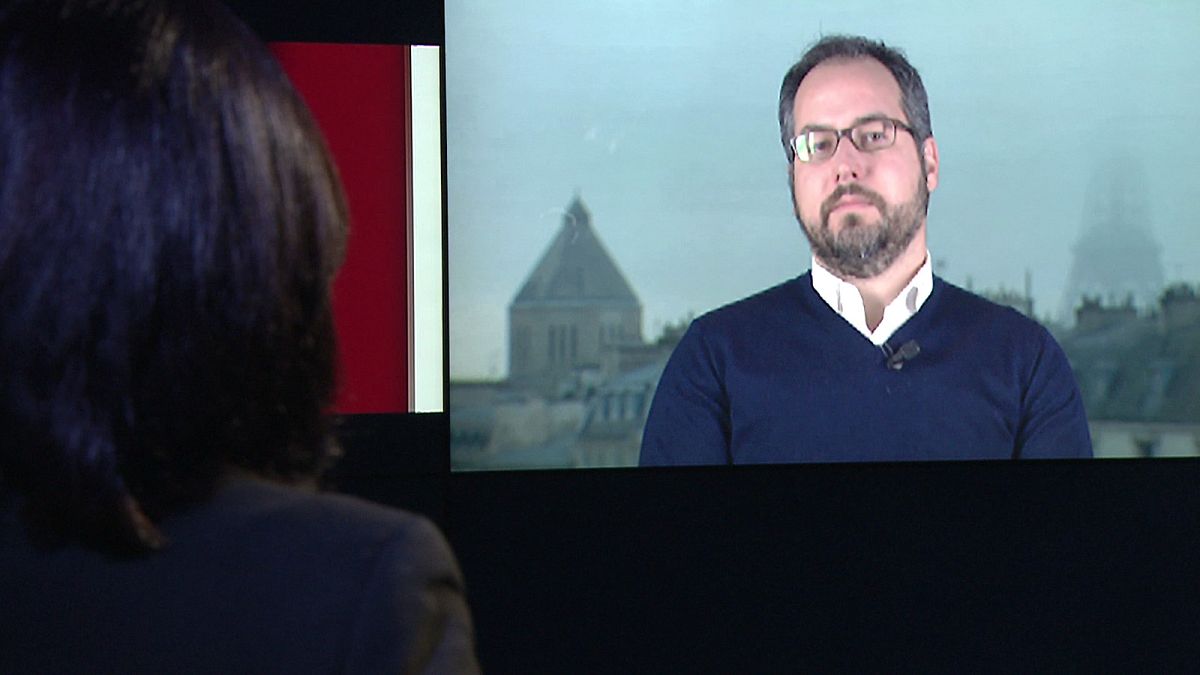Nadim Houry is director of Human Rights Watch’s terrorism and counter-terrorism programme.
Nadim Houry is director of Human Rights Watch’s terrorism and counter-terrorism programme. He spoke to Euronews Insiders about how victims of torture in Syria can seek justice in Europe.
Insiders host Sophie Claudet asked Houry about the scope and magnitude of torture in Syria, in his experience.
Sophie Claudet, Euronews:
“Is it is something that is quite systematic, whether in government jails, whether in hospitals – we know that medical facilities have been used as torture centres. How widespread is it, and why?”
Nadim Houry, HRW:
“It is systematic and widespread. I’ve been doing human rights work for 15 years in many parts of the world… I have rarely seen such a systematic practice as I have seen in Syria… of torture.
“It’s basically a mechanism of control by the security services of society. It’s not new, it has been a pillar of the power of the regime in Syria since the late 1970s. They actually still use some of the same techniques that colleagues of mine documented in the 1980s. Why do they do that? Because like many autocracies and dictatorships, they want to create a wall of fear to contain society and to control members. And as the uprising began in 2011 we saw these practices increase in magnitude and scale to even control more and more of the people.”
Sophie Claudet, Euronews:
“We saw in our report that several perpetrators of torture have made their way to Europe. Have some of those been convicted already?”
Nadim Houry, HRW:
“There have been indeed a number of prosecutions in Europe, particularly in Sweden and Germany. We talking… not more than a dozen in both countries. They have led to some convictions for torture, and in some cases, people have been accused of terrorism charges or executions.”
Sophie Claudet, Euronews:
“There are also Syrians who have been tortured by rebel groups. Have you come across such cases, and can those crimes be prosecuted as well?”
Nadim Houry, HRW:
“Yes definitely. I mean we’ve documented torture and executions by other groups opposed to the government. Both used to be known as the Free Syrian Army, but also groups associated with Al-Nusra, or with ISIS.
“And we have seen prosecutions of such cases in Europe. Actually, in terms of sheer number of prosecutions on European soil, most of the accused have been members of what would be considered Syrian opposition armed groups, or the latter groups. Why? Simply because more of them have escaped Syria and it was easier to prosecute them.”
Sophie Claudet, Euronews:
“So how about those perpetrators who are still in Syria, or those who covered for, or ordered torture? The testimonies of the victims that we saw in the report are enough to possibly prosecute them?”
Nadim Houry, HRW:
“If they find that they have enough evidence without actually being able to investigate the person, we could see potentially a local arrest warrant, and maybe one day a form of international arrest warrant, if there is any sort of agreement between the two countries.
“If the perpetrator stays in Syria, there is very little that can be done in the current context to arrest them. But at least this arrest warrant, on a European level, can act as a sort of sword over the head of these perpetrators if they ever travel to Europe.”
Sophie Claudet, Euronews:
“And is it fair to say that even if it’s going to take a while until these people get justice, all this evidence that is being collected, all these testimonies that are being heard, down the line maybe one day will be very useful to be used within the context of the ICC, for example, or any other tribunal that could be set up?”
Nadim Houry, HRW:
“We should keep in mind that these prosecutions in Europe should only be one component of a much broader justice approach to the conflict in Syria which saw so many war crimes and crimes against humanity.
“There still needs to be a political move towards referring the situation to an international tribunal. Will this happen in the Security Council given Russia’s opposition? Maybe not, but could there be alternative avenues potentially through the General Assembly?
“We would like to think so, and we are lobbying many governments in that direction. But hopefully as the level of violence comes down in Syria, local voices inside Syria will start demanding justice more forcefully, and we hope the international community will magnify these voices.”
Sophie Claudet, Euronews:
“But the Syria file is eminently political. Do you think that justice can supersede politics?”
Nadim Houry, HRW:
“Can justice supersede it? We don’t like to think in these terms. I mean, it’s more can you create a track for justice, so you sow the seeds of accountability.
“And if politically it’s impossible to get accountability today because senior security members are not going to be travelling outside of Syria, can you at least sow the seeds today (so) that the next time they travel they will be arrested.
“Can you sow the seeds today that Syria, maybe not tomorrow but in five years has an independent judiciary that has the courage to prosecute these members. It may seem a leap of faith today but the experience in places like Argentina, the experience in places in Africa for instance in Chad, have shown that what may look like it would be impossible today becomes possible tomorrow. But the only way it becomes possible tomorrow is if you start working on it today.”
